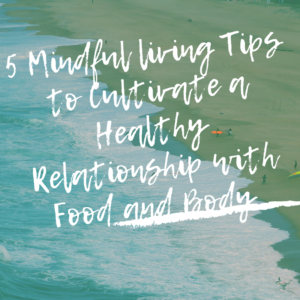What is Weight Neutral Care?
 Have you ever heard the phrase “weight neutral care”?
Have you ever heard the phrase “weight neutral care”?
To be honest, at first when I heard this phrase many years ago, I didn’t know what it meant. So, I dove deep to learn more about it.
Weight neutral care “supports the enhancement of physical and mental health for people of all sizes without the intention of weight change”. (haesaustralia.org)
In simple terms, weight neutral care takes the emphasis off weight loss and instead provides evidenced-based interventions to promote health.
Research shows that weight is not a reliable predictor of health. Your health is multifaceted and cannot be inferred simply from weight or a number on the scale.
In health care, focusing on weight (known as weight centered care) promotes more harm than good. It causes weight stigma, disordered eating, weight cycling and more.
Imagine going to the doctor for a sore throat and leaving with a prescription for weight loss. This happens all the time. How soon do you think you’re going to want to go back to this doctor? So you delay caring for your health, because you want to protect yourself from fat shaming in the doctor’s office.
In this weight centered approach to healthcare, the doctors, nurses and other medical professionals focus on weight loss as the be all end all of managing disease.
This approach sends 2 FALSE messages to the patient:
Message #1: Weight loss is a behavior that you can just do (FALSE!)
Message #2: Weight loss is the cure for disease (FALSE!)
Instead what this message causes is disordered eating, weight cycling and creates a stigma around weight and body.
Weight loss is not a behavior, it is an outcome of habit and behavior change.
You have a lot less control over what you weigh than what society and the current culture has led you to believe.
Factors that influence weight
There are many factors that go into your weight or body composition—genetics, environmental influences, age, hormones, sex, medical conditions, socioeconomic status, medications, and so much more!
Shifting the focus away from weight loss and instead bringing into focus behaviors and habits one can change (like food choices, regular movement, stress management) is the main focus of weight neutral care, and the approach I recommend people to take when wanting to improve one’s health.
Weight Neutral Care is Not Anti-Weight Loss
This is a very important point. Those who advocate for weight neutral care are not against potential weight loss that can happen when you change your habits and behaviors. It simply removes the pressure and views weight loss as a possible “outcome” rather than a “behavior” or “skill” that you can do.
Habits and Behaviors that Can Improve Health
- Listen to your body: I know, this is easier said than done with all the noise out in diet culture. Consider seeking support and surround yourself with others that are on the same journey. (Click here for a free online community of support).
- Engage in gentle movement that is enjoyable and kind to your body. There’s no extra health benefit to beating yourself up in the gym. Find something that energizes you, not something that depletes you.
- Become aware: Tap in to how eating certain foods, or amounts of foods, feels in your body. Allow this information to inform future eating decisions.
- Practice mindful living! Not just mindful eating (but yes, of course this is important too), but mindfully move through all aspects of your day from the moment you wake up until you go to sleep.
- Change the self-talk: Ahh, another one easier said than done. If you’ve been trying to lose weight and keep it off for a long time, then chances are the tape that plays in your head doesn’t sound so nice. It is imperative to work on changing the negative self-talk to positive self-talk!
Key takeaway: Focus on habits and behaviors to improve your health, rather than on weight loss. You will see how much better you feel.









